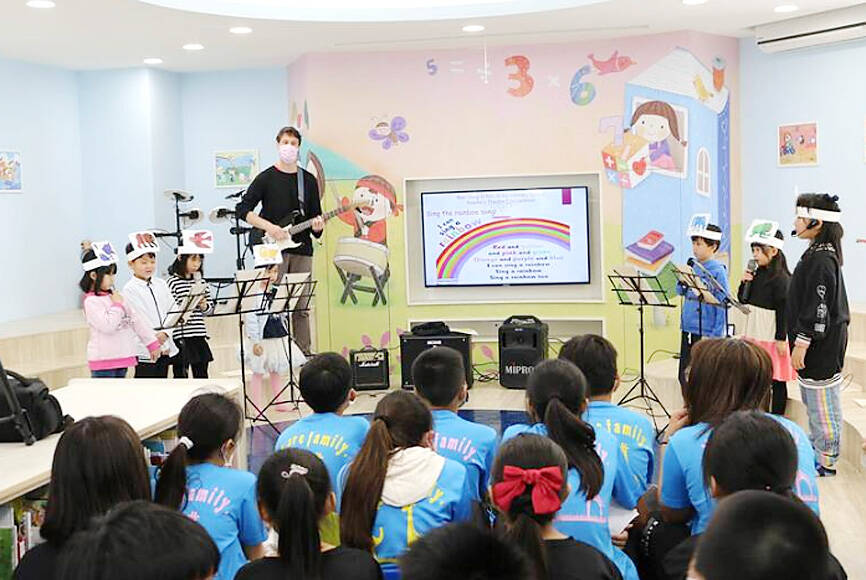The government is aiming to recruit 1,096 foreign English teachers and teaching assistants this year, the Ministry of Education said yesterday.
The foreign teachers would work closely with elementary and junior-high instructors to create and teach courses, ministry official Tsai Yi-ching (蔡宜靜) said.
Together, they would create an immersive language environment, helping to motivate students while enhancing the skills of local teachers, she said.

Photo courtesy of the Ministry of Education
The ministry has since 2021 been recruiting foreign teachers through the Taiwan Foreign English Teacher Program, which offers placement, salary, housing and other benefits to eligible foreign teachers.
Two centers serving northern and southern Taiwan assist in recruiting and training foreign English teachers and teaching assistants, and help supervise them after placement, the program’s Web site says.
Tsai welcomed anyone from an English-speaking nation who is interested in teaching at elementary and junior-high level to apply through the program, which is to be expanded this year.
Applications can be made online at any time, followed by an interview, with offers given on a rolling basis.
Those with a passport from nations whose official or common language is English and who have a bachelor’s degree or higher are eligible to apply.
People applying to be teachers must also either have a teaching license or have taught English at an accredited foreign school for more than a year.
Teaching assistants are exempt from the requirement.
Those accepted through the program would receive a guaranteed salary dependent on their qualifications and seniority; flight and housing reimbursement; a performance bonus; overtime pay; and health and labor insurance.
Tsai said the ministry would also cover the cost of flights for immediate family members and reimburse testing fees for teaching assistants seeking certification.
To assist in career development, the ministry would also help teachers interested in transitioning to training or advisory roles, Tsai added.
More information is available on the program’s Web site at https://tfetp.epa.ntnu.edu.tw.

FORCED LABOR: A US court listed three Taiwanese and nine firms based in Taiwan in its indictment, with eight of the companies registered at the same address Nine companies registered in Taiwan, as well as three Taiwanese, on Tuesday were named by the US Department of the Treasury’s Office of Foreign Assets Control (OFAC) as Specially Designated Nationals (SDNs) as a result of a US federal court indictment. The indictment unsealed at the federal court in Brooklyn, New York, said that Chen Zhi (陳志), a dual Cambodian-British national, is being indicted for fraud conspiracy, money laundering and overseeing Prince Holding Group’s forced-labor scam camps in Cambodia. At its peak, the company allegedly made US$30 million per day, court documents showed. The US government has seized Chen’s noncustodial wallet, which contains

SUPPLY CHAIN: Taiwan’s advantages in the drone industry include rapid production capacity that is independent of Chinese-made parts, the economic ministry said The Executive Yuan yesterday approved plans to invest NT$44.2 billion (US$1.44 billion) into domestic production of uncrewed aerial vehicles over the next six years, bringing Taiwan’s output value to more than NT$40 billion by 2030 and making the nation Asia’s democratic hub for the drone supply chain. The proposed budget has NT$33.8 billion in new allocations and NT$10.43 billion in existing funds, the Ministry of Economic Affairs said. Under the new development program, the public sector would purchase nearly 100,000 drones, of which 50,898 would be for civil and government use, while 48,750 would be for national defense, it said. The Ministry of

SENATE RECOMMENDATION: The National Defense Authorization Act encourages the US secretary of defense to invite Taiwan’s navy to participate in the exercises in Hawaii The US Senate on Thursday last week passed the National Defense Authorization Act (NDAA) for Fiscal Year 2026, which strongly encourages the US secretary of defense to invite Taiwan’s naval forces to participate in the Rim of the Pacific (RIMPAC) exercise, as well as allocating military aid of US$1 billion for Taiwan. The bill, which authorizes appropriations for the military activities of the US Department of Defense, military construction and other purposes, passed with 77 votes in support and 20 against. While the NDAA authorizes about US$925 billion of defense spending, the Central News Agency yesterday reported that an aide of US

NINE-IN-ONE ELECTIONS: Prosecutors’ offices recorded 115 cases of alleged foreign interference in the presidential election campaign from August 2023 to Dec. 13 last year The National Security Bureau (NSB) yesterday said that it has begun planning early to counter Chinese interference in next year’s nine-in-one elections as its intelligence shows that Beijing might intensify its tactics, while warning of continued efforts to infiltrate the government and military. The bureau submitted a report to the Legislative Yuan ahead of a meeting today of the Foreign Affairs and National Defense Committee. “We will research situations in different localities and keep track of abnormalities to ensure that next year’s elections proceed without disruption,” the bureau said. Although the project is generally launched during election years, reports of alleged Chinese interference